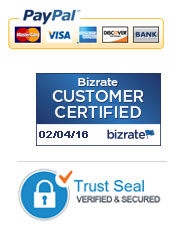A Guide to Choosing the Right Puppy Collar
by Joanne on January 18, 2014 - Leave a Comment
Choosing the Right Puppy Collar
You’ve probably just acquired a new puppy, and that is what has drawn you to this article on choosing a puppy collar for your dog. First off, congratulations! Second, you are about to embark on an important purchase that will impact how you and your dog interact. So we are so glad you are doing your research and have landed here!
Selecting the best collar for a puppy is one of the most important decisions you will probably ever make aside from puppy health issues and a name. Why? Because a collar helps ensure your dog’s safety and serves as a effective communication tool between you and your new pup. You will likely encounter many different opinions regarding dog collars and which type is the best choice. In the end, your decision will be based on three things: your dogs breed, your lifestyle, and the expectations you have for your dogs behavior.
Why Breed Matters
Whether you made a conscious choice in breed when you acquired your new pup,or are one of those wonderful folks who rescue and adopt, you had some idea of what you wanted in a dog (size, coat, color, personality,etc.). Consider these characteristics when shopping for collars. For example, if you have an American Bulldog, you’ll need a large collar, but not necessarily an indestructible one, considering this breeds personality. Most buckle or snap-on dog collars will suit this breed just fine. Say you have a greyhound. A slip-on martingale collar would be a better choice because greyhounds have narrow heads that tend to slip out of traditional dog collars easily. If you have a long haired dog like a Maltese, you will want to consider fabric dog collars or dog harnesses that will minimize matting of the coat.
There are many things to consider, which is why breed matters. Consider how much condition and appearance of the collar matters to you as well. I suggest to many of my clients that their first dog collar purchase be viewed as temporary, because your pup will eventually grow out of it. It is also likely to get chewed and scratched up within the first 3 months of purchase because puppies tend to chew, scratch, and in some cases don’t take to wearing a dog collar very easily or right away.
Blending Your Lifestyle with Your Dog
If you’re active, outdoors or a city dweller, you’ll want a collar and leash set that will aid in keeping your dog safe when you are out and about. In contrast, if you are more of an indoor type and live in a quiet community with a fenced in yard, well … let’s just say that your dog’s collar and leash needs will be very different.
For those that love walking the dog and are out and about frequently, you’ll probably want something that is comfortable for your dog’s neck and your hand. Nylon collars are the material of choice because nylon is strong yet lightweight and comfortable. For those that are the sporting/hunting kind, man’s best friend is likely to need a solid leather collar that will last a long time and better withstand harsher conditions and outdoor elements.
Your Dog’s Manners
Yes, manners count for some! Many dog owners have a vision of a dog that shows restraint on walks and is really good at the command “stay” when the doorbell rings. For others, this may not be a concern – just “sit” and “come” will do. So for those that plan to train your puppy, training gear will be part of their dog walking equipment. Martingales are the dog trainers best friend and perfect for leash-training puppies. While basic choke training collars can be had for a few bucks, many prefer the kinder, gentler version of the martingale collar in fabric styles. You should have both a martingale collar for training, and traditional collar for treat training and everyday wear.
Take a little time to consider these factors, and you’ll find yourself saving time and money down the road and on a path to a lasting and enjoyable relationship with your dog from puppy to adulthood.
Fit and Comfort
Regardless of breed, use or style, the two most important factors in your dogs collar is FIT and COMFORT. You will likely need to purchase 2 or 3 collars as your puppy grows into adulthood. Their collar should not be too loose not too tight. It should fit comfortably, so that your puppy will grow accustomed to wearing it quickly. Follow these links for two great tutorials for getting the right size quick release collar and fitting Fitting your dog for a martingale collar.
Tagged with: best puppy collar . collars for puppies . collars for training puppies . puppy collars . puppy training collars
 Loading... Please wait...
Loading... Please wait...








